Volvo Group Bundle
Can Volvo Group Maintain Its Momentum in a Changing World?
Founded in 1927, the Volvo Group has evolved from a Swedish car manufacturer to a global leader in sustainable transport and infrastructure solutions. With a rich history rooted in quality and innovation, Volvo Group SWOT Analysis provides insights into the company's strategic positioning. Today, the company's future prospects are closely tied to its ability to navigate the complexities of the global market.
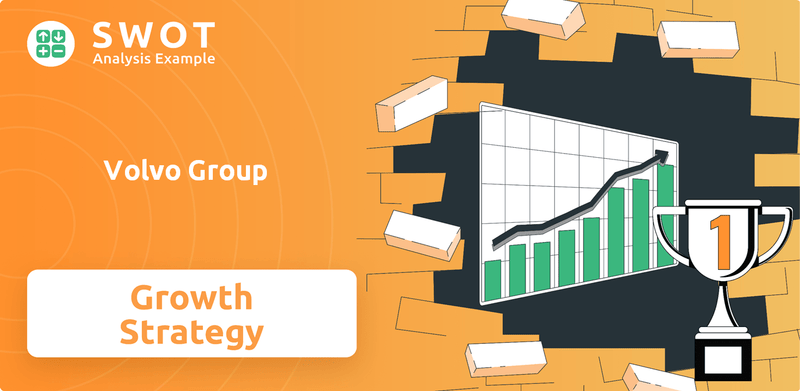
This exploration dives into the core of Volvo Group's Growth Strategy Volvo, examining its ambitious plans for expansion and the innovative technologies driving its evolution. We'll analyze how Volvo Company is adapting to market changes, focusing on its financial performance and strategic partnerships. Understanding the Volvo Future Prospects requires a deep dive into its sustainable development initiatives and competitive landscape.
How Is Volvo Group Expanding Its Reach?
The Revenue Streams & Business Model of Volvo Group is heavily influenced by its expansion initiatives. These initiatives are crucial for maintaining its position as a leader in the automotive industry. The company's growth strategy focuses on both product innovation and strategic partnerships to tap into new markets and enhance existing ones.
Volvo Group's expansion plans are multifaceted, involving the launch of new products, strategic collaborations, and investments in sustainable technologies. These efforts are designed to meet the evolving demands of the market and ensure long-term growth. By focusing on innovation and partnerships, Volvo Group aims to strengthen its market position and drive future success.
The company's focus on electric vehicles and sustainable solutions is a key component of its growth strategy. This commitment is reflected in the development of new electric models and partnerships aimed at expanding charging infrastructure. These initiatives are critical for adapting to market changes and contributing to sustainable development.
In 2024 and 2025, Volvo Trucks launched new heavy-duty truck platforms and ranges designed to reduce CO2 emissions and improve fuel efficiency. The new North American platform aims to cut fuel consumption by up to 10%. Volvo Construction Equipment (Volvo CE) is also expanding its electric machine offerings.
Volvo Group is collaborating with Daimler Truck on a joint venture to develop a common software-defined vehicle platform, expected to be completed in the first half of 2025. The company is also involved in initiatives to expand electric truck charging infrastructure, including a joint venture in Europe to build 1,700 charging points by 2027.
Volvo Financial Services (VFS) supports the expansion of zero-tailpipe emission fleets through innovative financing solutions. A partnership with 4 Gen Logistics in California aims to achieve a 100% zero-emission fleet by the end of 2025. Volvo CE is expanding its range of electric machines, including the EWR150 Electric wheeled excavator.
The company is expanding its reach in North America, Europe, Australia, Asia, and Africa with new truck models. These expansions are supported by strategic partnerships and investments in sustainable technologies. These initiatives are vital for long-term growth.
Volvo Group's expansion initiatives span several key areas, including new product development, strategic partnerships, and investments in electric vehicle technology. These efforts are designed to drive growth and strengthen the company's market position. The focus on sustainable solutions is a key part of the company's long-term strategy.
- New heavy-duty truck platforms for North America, Europe, Australia, Asia, and Africa.
- Strategic partnerships with Daimler Truck for software development.
- Expansion of electric vehicle charging infrastructure.
- Financial solutions to support zero-emission fleets.
Volvo Group SWOT Analysis
- Complete SWOT Breakdown
- Fully Customizable
- Editable in Excel & Word
- Professional Formatting
- Investor-Ready Format
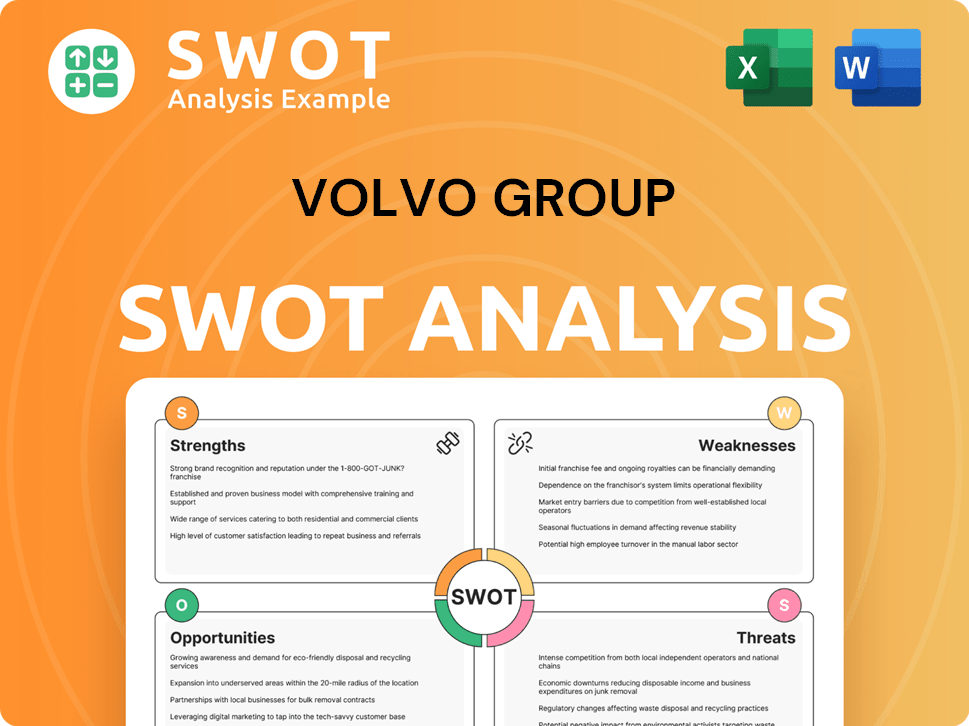
How Does Volvo Group Invest in Innovation?
The Volvo Group is strategically leveraging technology and innovation to foster sustained growth. Their focus is on digital transformation, automation, and cutting-edge technologies, with a strong emphasis on sustainability. This approach is crucial for navigating the evolving automotive industry and meeting the demands of a changing market.
The company's research and development investments are primarily directed towards developing fossil-free transport solutions. This includes battery electric vehicles, hydrogen fuel cells, and combustion engines powered by renewable biofuels. The overarching goal is to achieve net-zero greenhouse gas emissions across its entire value chain by 2040, demonstrating a strong commitment to environmental sustainability. This commitment is vital for long-term success and aligns with global trends towards greener technologies.
A significant aspect of the Volvo Group's digital transformation involves a joint venture with Daimler Truck. This collaboration aims to create a software-defined vehicle platform and a dedicated truck operating system. This initiative, expected to be finalized in the first half of 2025, will enable the development of stand-alone digital vehicle functions and facilitate over-the-air updates. This will significantly enhance efficiency and improve the customer experience. The decoupling of software and hardware development cycles provides a flexible base for future digital features, which is critical for staying competitive.
Volvo is launching new energy-efficient truck models to reduce CO2 emissions and improve fuel consumption. The new Volvo FH Aero is optimized for energy-efficient heavy-duty transports in Europe, Australia, Asia, and Africa. These models have the potential to reduce CO2 and energy consumption by up to five percent.
In North America, the new VNL and VNR models are built on a new platform. This platform is designed for all future propulsion technologies, including electric, fuel cell, and renewable fuel internal combustion engines. This strategic move ensures adaptability to various energy sources.
Volvo Construction Equipment is expanding its electric machine range. This includes new excavators and wheel loaders, supported by a broader range of charging solutions and a new digital app for managing the charging process. This expansion highlights the company's commitment to electrification.
Volvo is actively incorporating low-CO2-emission steel into its truck production. Frame rails in approximately 12,000 Volvo FH and FM model trucks will be made of such steel from 2025. This will lead to significant CO2 equivalent savings. This initiative is a step towards sustainable manufacturing.
The company continues to develop active safety systems. These systems use smart sensors and intelligent processing to assist and warn drivers. They can also take automatic action in emergencies. This focus on safety enhances the driving experience.
The joint venture with Daimler Truck is a key part of Volvo Group's digital transformation. It aims to create a software-defined vehicle platform. This will enable stand-alone digital vehicle functions and over-the-air updates. This initiative is expected to be finalized in the first half of 2025.
Volvo Group's strategic initiatives focus on digital transformation, electrification, and sustainable materials. These efforts are designed to enhance efficiency, reduce emissions, and improve customer experience. The company's commitment to innovation is evident in its investments in R&D and strategic partnerships. For more details, you can read about Owners & Shareholders of Volvo Group.
- Digitalization: The joint venture with Daimler Truck focuses on a software-defined vehicle platform and a truck operating system.
- Electrification: Expansion of electric machine ranges and development of electric, fuel cell, and renewable fuel vehicles.
- Sustainability: Use of low-CO2-emission steel and development of fossil-free transport solutions.
- Safety: Development of active safety systems with smart sensors and intelligent processing.
Volvo Group PESTLE Analysis
- Covers All 6 PESTLE Categories
- No Research Needed – Save Hours of Work
- Built by Experts, Trusted by Consultants
- Instant Download, Ready to Use
- 100% Editable, Fully Customizable
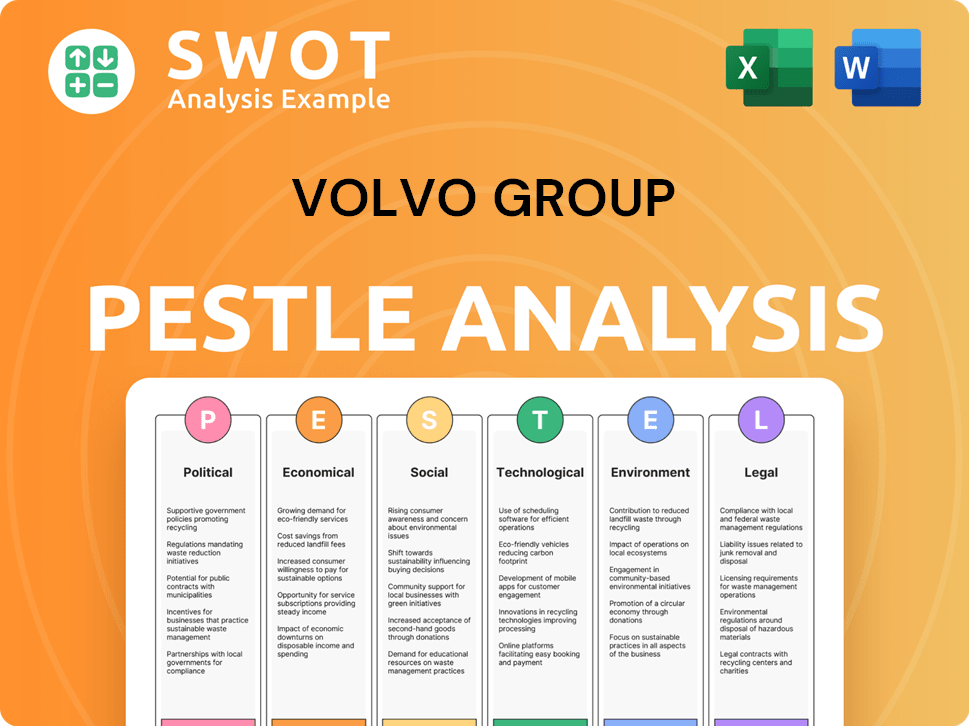
What Is Volvo Group’s Growth Forecast?
The financial outlook for the Volvo Group reflects a period of adaptation and strategic recalibration. The company navigated a challenging market in 2024 and the first quarter of 2025, marked by fluctuating demand and global economic pressures. The focus remains on maintaining profitability and investing in future growth areas, particularly in services and sustainable transport solutions.
In 2024, the Volvo Group demonstrated resilience, with strong operating cash flow despite a decrease in net sales. However, Q1 2025 showed a decline in both sales and operating income, signaling the need for ongoing strategic adjustments. The group is addressing these challenges through cost management and efficiency improvements.
The performance of Volvo Cars, though a separate entity, also influences the overall brand perception and financial health. The launch of a cost-saving plan by Volvo Cars indicates a proactive approach to managing profitability in a dynamic market. The Volvo Group's strong net cash position provides a solid foundation for future investments and shareholder returns.
Net sales for the full year 2024 were SEK 526.8 billion, a 3% decrease adjusted for currency. Vehicle sales declined by 5%, while service sales increased by 4%. Adjusted operating income was SEK 65.7 billion, with an adjusted operating margin of 12.5%.
Net sales for Q1 2025 decreased by 7% (currency adjusted) to SEK 121.8 billion. Vehicle sales were 9% lower than in Q1 2024. Adjusted operating income was SEK 13.3 billion, with an operating margin of 10.9%. Earnings per share were SEK 4.86.
The Board proposed an ordinary dividend of SEK 8.00 per share and an extra dividend of SEK 10.50 per share for 2024. The net cash position in Industrial Operations at the end of 2024 was SEK 85.9 billion.
Volvo Cars reported revenue of SEK 82.9 billion in Q1 2025, down from SEK 93.9 billion in Q1 2024. Operating income for Volvo Cars was SEK 1.9 billion, a decrease from SEK 6.8 billion in Q1 2024. A cost and cash action plan of SEK 18 billion has been launched.
The Volvo Group is facing a normalizing market demand, impacting sales volumes. The company is responding by focusing on service sales, which show growth, and implementing cost-saving measures. These adjustments are crucial for maintaining profitability.
The company is actively managing its cost base and production efficiency. The decline in Q1 2025 operating income highlights the need for strategic agility. These adjustments are vital for the long-term success of the Volvo Company.
The strong net cash position provides financial flexibility for investments. The dividend proposals reflect confidence in the company's financial stability. This financial strength supports the Volvo Group's future growth plans.
The focus on services and sustainable transport solutions will be key. The company is adapting to market changes by investing in new technologies and solutions. The Volvo Group is committed to sustainable development initiatives.
Both the Volvo Group and Volvo Cars are implementing cost-saving measures. These actions are designed to protect profitability in a challenging environment. Efficient cost management is a key element of the Volvo Business strategy.
The Growth Strategy Volvo includes a focus on electric vehicles and autonomous driving technology. The company is also exploring strategic partnerships and collaborations to expand its market presence. For more details, see Marketing Strategy of Volvo Group.
Volvo Group Business Model Canvas
- Complete 9-Block Business Model Canvas
- Effortlessly Communicate Your Business Strategy
- Investor-Ready BMC Format
- 100% Editable and Customizable
- Clear and Structured Layout
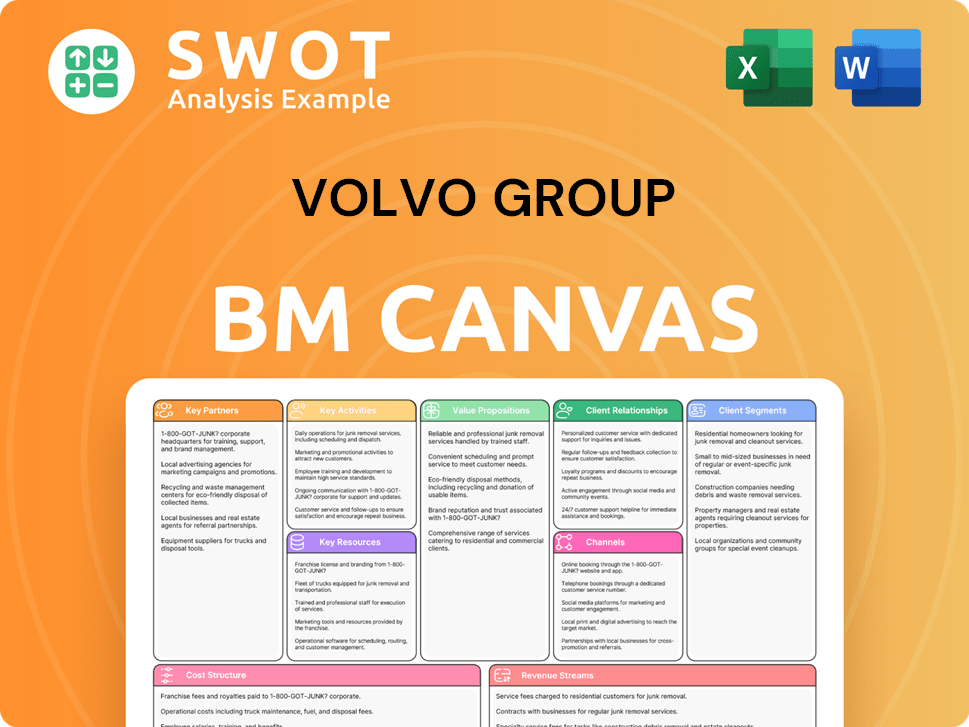
What Risks Could Slow Volvo Group’s Growth?
The Volvo Group faces significant risks and obstacles that could affect its growth strategy and future prospects. These challenges range from intense market competition to the rapid pace of technological and regulatory changes. Understanding these potential pitfalls is crucial for investors and stakeholders assessing the Volvo Company's long-term viability and Volvo Business strategies.
One of the primary areas of concern is market dynamics. Geopolitical instability and regionalization are adding complexity to the operational environment. The need to adapt to sustainable transport solutions requires flexibility and resilience. The Volvo Market Analysis must account for these ever-changing market conditions to maintain a competitive edge.
Regulatory changes, such as the EU Mobility Package, pose a considerable hurdle. The mandate for second-generation smart tachographs in new trucks and the replacement of older models by specific deadlines necessitate substantial investments and meticulous planning. Adapting to these regulatory demands impacts the company's financial and operational strategies, making it vital to analyze how Volvo Group is managing these transitions.
The automotive industry is highly competitive, with numerous global and regional players vying for market share. This competition puts pressure on pricing, innovation, and customer service.
Geopolitical events, such as trade disputes and political unrest, can disrupt supply chains and affect demand in key markets. These uncertainties can lead to fluctuations in sales and profitability.
Changes in environmental regulations, safety standards, and trade policies can require significant investments and adjustments. These regulations can impact product development and market access.
Disruptions in the supply of critical components, such as batteries and semiconductors, can halt production and affect sales. Dependence on specific suppliers increases the risk of supply chain disruptions.
The rapid development of new technologies, such as electric vehicles and autonomous driving systems, requires significant investment and adaptation. Failure to keep pace with these advancements can lead to a loss of market share.
Economic recessions can lead to reduced demand for commercial vehicles and construction equipment. Economic downturns can significantly affect sales volumes and profitability.
Volvo Group is actively adapting to market changes through strategic partnerships and diversification. Collaborations in areas like batteries, fuel cell systems, and autonomous vehicles are crucial. Management focuses on fact-based decision-making and close customer relationships to mitigate risks.
To address supply chain vulnerabilities, Volvo Group is adjusting its supply chain strategies. This includes modifying production levels and reviewing sales agreements and pricing. The goal is to reduce the impact of tariffs and other disruptions.
In Q1 2025, Volvo Group's vehicle sales decreased by 9% due to tariff uncertainties. The company has adjusted its 2025 North American sales forecast for heavy-duty trucks to 275,000 units, a reduction of 25,000 units. This has led to preparations for layoffs at its Pennsylvania and Maryland operations.
Volvo Group mitigates risks through diversification, risk management frameworks, and scenario planning. The company focuses on partnerships and collaborations. Management also assesses risks through fact-based decisions and maintaining close customer relationships.
Volvo Group Porter's Five Forces Analysis
- Covers All 5 Competitive Forces in Detail
- Structured for Consultants, Students, and Founders
- 100% Editable in Microsoft Word & Excel
- Instant Digital Download – Use Immediately
- Compatible with Mac & PC – Fully Unlocked
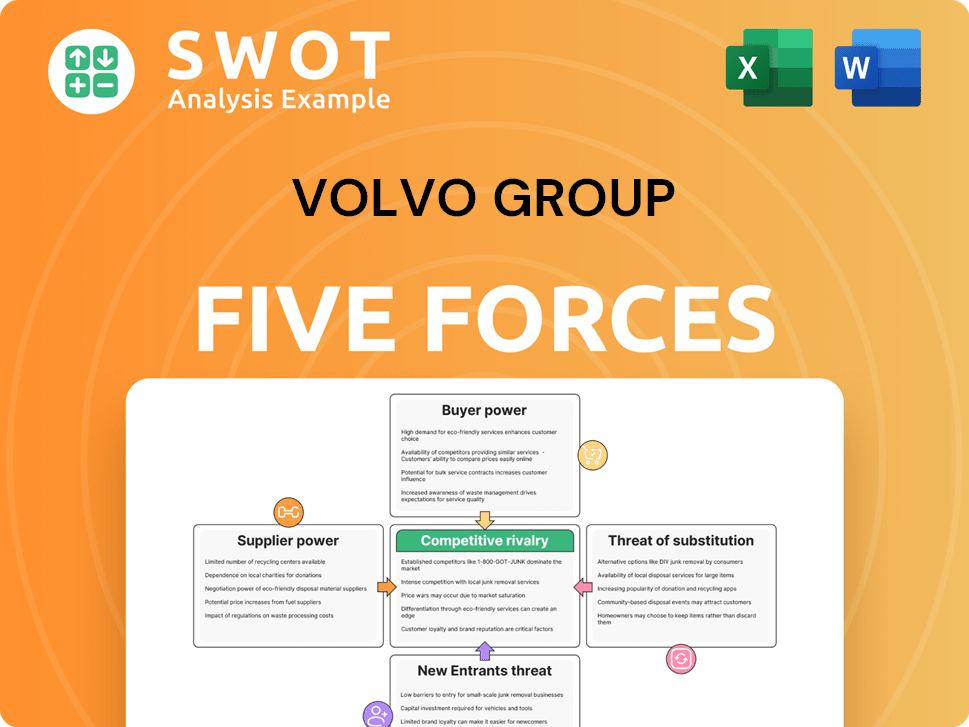
Related Blogs
- What are Mission Vision & Core Values of Volvo Group Company?
- What is Competitive Landscape of Volvo Group Company?
- How Does Volvo Group Company Work?
- What is Sales and Marketing Strategy of Volvo Group Company?
- What is Brief History of Volvo Group Company?
- Who Owns Volvo Group Company?
- What is Customer Demographics and Target Market of Volvo Group Company?
Disclaimer
All information, articles, and product details provided on this website are for general informational and educational purposes only. We do not claim any ownership over, nor do we intend to infringe upon, any trademarks, copyrights, logos, brand names, or other intellectual property mentioned or depicted on this site. Such intellectual property remains the property of its respective owners, and any references here are made solely for identification or informational purposes, without implying any affiliation, endorsement, or partnership.
We make no representations or warranties, express or implied, regarding the accuracy, completeness, or suitability of any content or products presented. Nothing on this website should be construed as legal, tax, investment, financial, medical, or other professional advice. In addition, no part of this site—including articles or product references—constitutes a solicitation, recommendation, endorsement, advertisement, or offer to buy or sell any securities, franchises, or other financial instruments, particularly in jurisdictions where such activity would be unlawful.
All content is of a general nature and may not address the specific circumstances of any individual or entity. It is not a substitute for professional advice or services. Any actions you take based on the information provided here are strictly at your own risk. You accept full responsibility for any decisions or outcomes arising from your use of this website and agree to release us from any liability in connection with your use of, or reliance upon, the content or products found herein.